Unit 2 Neighbours. Period 3 Grammar 课件(共31张PPT) 2023-2024学年牛津译林版英语七年级下册
文档属性
| 名称 | Unit 2 Neighbours. Period 3 Grammar 课件(共31张PPT) 2023-2024学年牛津译林版英语七年级下册 | 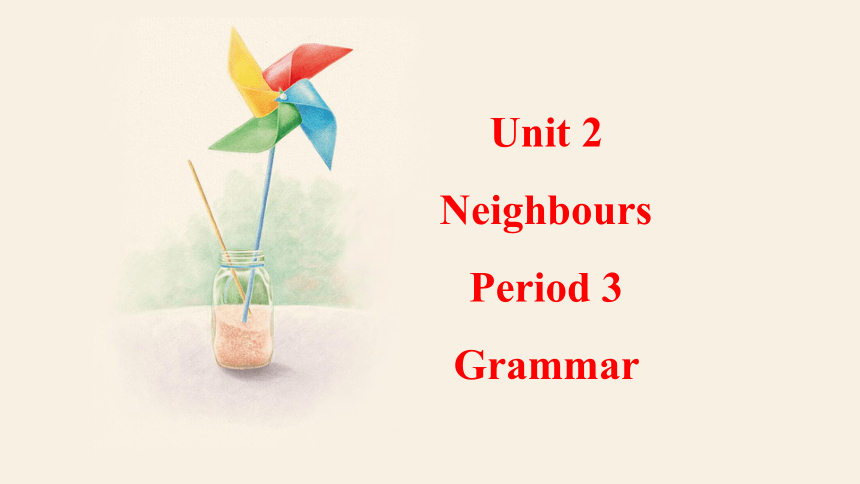 | |
| 格式 | pptx | ||
| 文件大小 | 967.3KB | ||
| 资源类型 | 教案 | ||
| 版本资源 | 牛津译林版 | ||
| 科目 | 英语 | ||
| 更新时间 | 2023-12-29 00:04:53 | ||
图片预览


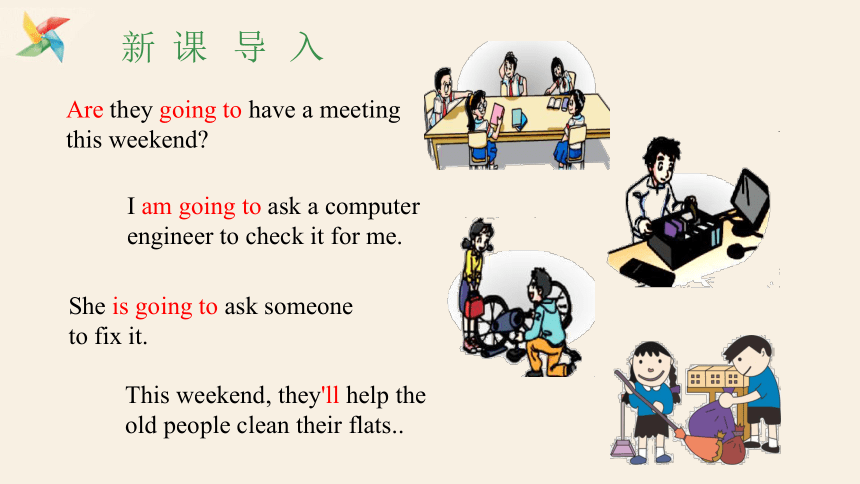

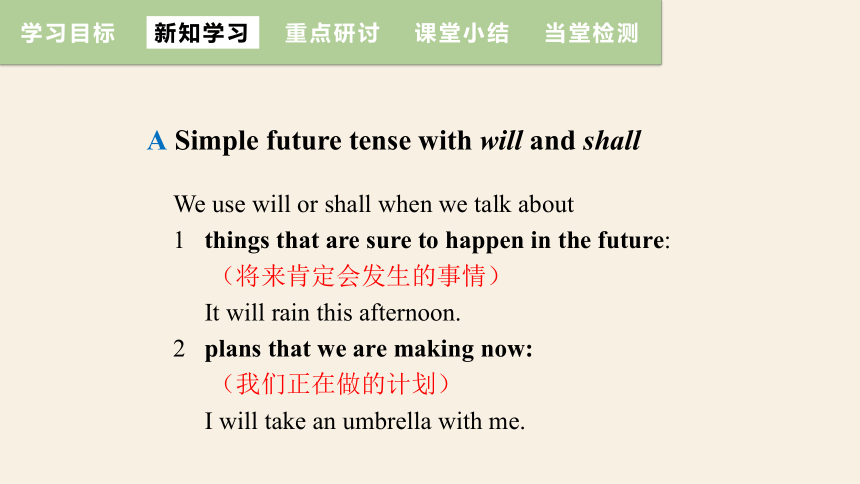

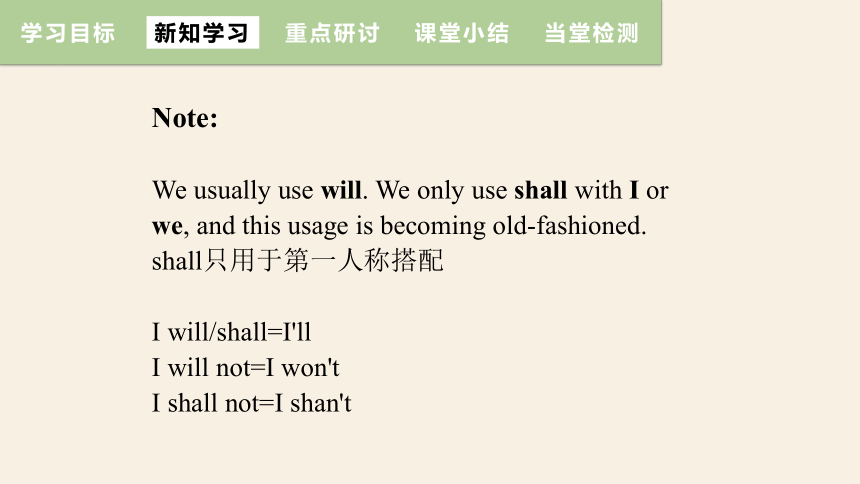

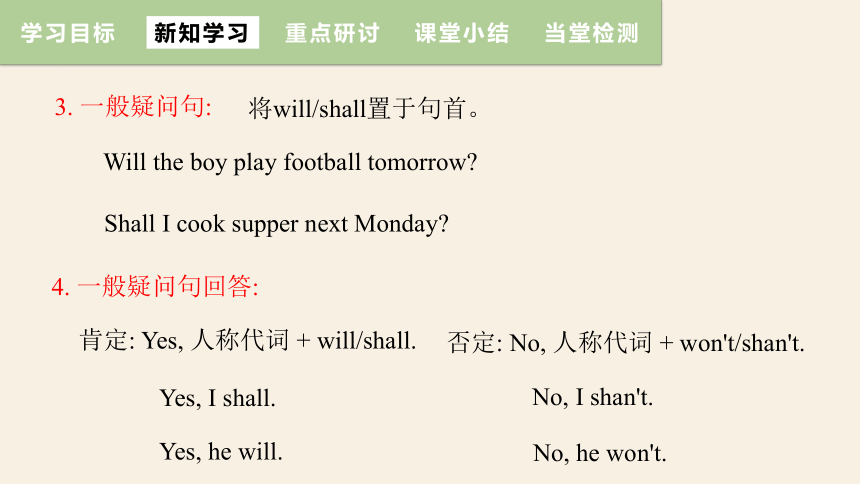
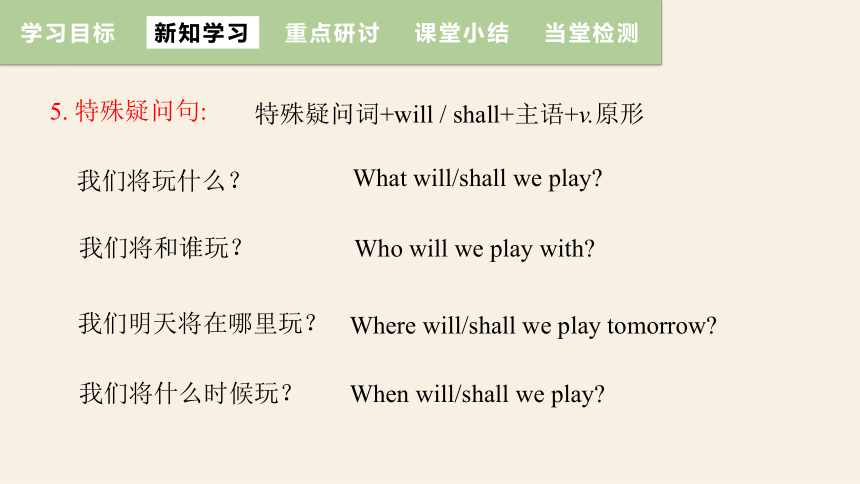

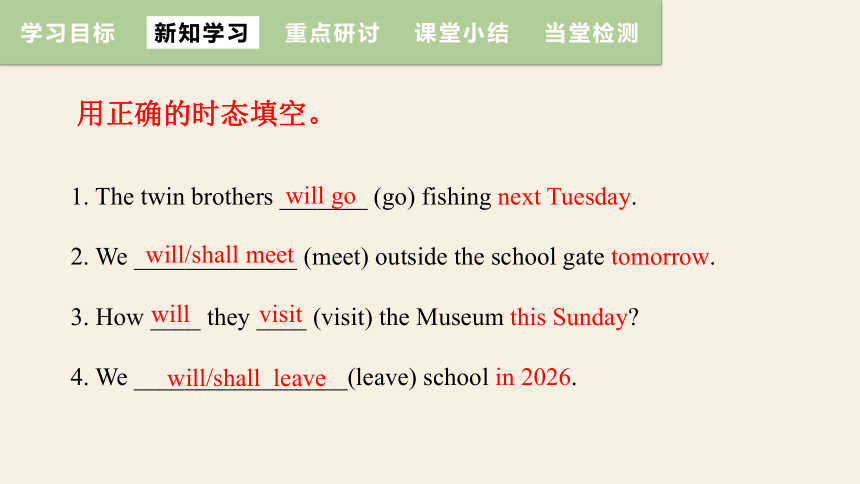
文档简介
(共31张PPT)
Unit 2
Neighbours
Period 3
Grammar
新
课
导
入
Read and find
12/27/2023
Where are you going
I'm going to visit our new neighbours.
I'll meet them too!
I'm afraid they won't welcome visitors like you.
新
课
导
入
12/27/2023
Are they going to have a meeting this weekend
I am going to ask a computer engineer to check it for me.
She is going to ask someone to fix it.
This weekend, they'll help the old people clean their flats..
Language Goal
1.能用will、shall和be going to表示将来。
2.能掌握一般将来时的肯定、否定、疑问
形式和肯定、否定回答的基本用法。
新知学习
课堂小结
当堂检测
学习目标
重点研讨
新知学习
课堂小结
当堂检测
学习目标
重点研讨
A Simple future tense with will and shall
We use will or shall when we talk about
1 things that are sure to happen in the future:
(将来肯定会发生的事情)
It will rain this afternoon.
2 plans that we are making now:
(我们正在做的计划)
I will take an umbrella with me.
新知学习
课堂小结
当堂检测
学习目标
重点研讨
We make positive and negative forms like this:
I/We go.
You/They/He/She/It
Yes, I/we
you/they he/she/it
No, I/we
you/they/he/she/it
will/shall.
will.
will not/
shall not.
will not.
will (not)/shall (not)
will (not)
We ask and answer questions like this:
I/we go
you/they/he/she/it
Will/Shall
Will
新知学习
课堂小结
当堂检测
学习目标
重点研讨
Note:
We usually use will. We only use shall with I or
we, and this usage is becoming old-fashioned.
shall只用于第一人称搭配
I will/shall=I'll
I will not=I won't
I shall not=I shan't
新知学习
课堂小结
当堂检测
学习目标
重点研讨
1. 肯定句:
will/shall + v.原形
The boy will play football tomorrow.
I shall cook supper next Monday.
2. 否定句:
will/shall + not + v.原形
The boy will not /won't play football tomorrow.
will / shall一般将来时各种句式:
I shall not /shan't cook supper next Monday.
新知学习
课堂小结
当堂检测
学习目标
重点研讨
3. 一般疑问句:
将will/shall置于句首。
Will the boy play football tomorrow
Shall I cook supper next Monday
4. 一般疑问句回答:
肯定: Yes, 人称代词 + will/shall.
否定: No, 人称代词 + won't/shan't.
Yes, I shall.
Yes, he will.
No, I shan't.
No, he won't.
新知学习
课堂小结
当堂检测
学习目标
重点研讨
5. 特殊疑问句:
What will/shall we play
Who will we play with
我们将玩什么?
我们将和谁玩?
我们明天将在哪里玩?
Where will/shall we play tomorrow
我们将什么时候玩?
When will/shall we play
特殊疑问词+will / shall+主语+v.原形
新知学习
课堂小结
当堂检测
学习目标
重点研讨
1. tomorrow/ tomorrow morning/afternoon…
2. the day after tomorrow 后天
3. next Tuesday/ week/year/month/Sunday..
4. the coming/following Sunday /weekend/Tuesday 即将到来的…
5. this evening /this afternoon/ tonight(今晚)
6. in + 一段时间 …之后 in an hour /in five days/in two years
8. soon
不久
将来时的典型标志:
7. in + 将来的年代
in 2024
in the future(在将来)
9. 祈使句, + 句子 (可用将来时/进行时)
Hurry up , or we __________(be) late.
will/shall be
新知学习
课堂小结
当堂检测
学习目标
重点研讨
1. The twin brothers _______ (go) fishing next Tuesday.
2. We _____________ (meet) outside the school gate tomorrow.
3. How ____ they ____ (visit) the Museum this Sunday
4. We _________________(leave) school in 2026.
will go
will/shall meet
will visit
will/shall leave
用正确的时态填空。
新知学习
课堂小结
当堂检测
学习目标
重点研讨
5. There __________(be) a match on TV tonight.
will be
6. She ___________ (come) to see me in a week.
will come
7. We ______________(go) to the Summer Palace soon.
will/shall go
8. ___________ we _____ (have) a trip the coming Sunday
Will/Shall
have
新知学习
课堂小结
当堂检测
学习目标
重点研讨
Simon's computer is broken. He is asking someone at the community centre for plete their conversation with the simple future tense of the verbs in brackets.
▲
Mr Lin: Hello, Simon. Do you need any help
Simon: Yes, Mr Lin. There's something wrong with my computer.
Mr Lin: OK. We ___________ (ask) an engineer to check it for you.
Simon: When _____ the engineer ___(be) free
Mr Lin: Well, we ___________(call) him first. _____ you _____(wait)
for us to call back
Simon: All right. I ___________ (wait) for your call. Thanks.
Mr Lin: You're welcome.
will/shall ask
will/shall call
will
Will
wait
will/shall wait
be
新知学习
课堂小结
当堂检测
学习目标
重点研讨
B Simple future tense with be going to
We use be going to when we talk about
1 somethings we decide to do:
(打算将要做的事情)
I am going to visit our new neighbours.
She is going to watch the film next Friday.
2 things that will probably happen:
(可能即将发生的事情)
It is nine o'clock. We are going to be late.
It is so cloudy. I think it is going to rain.
新知学习
课堂小结
当堂检测
学习目标
重点研讨
We ask and answer questions like this:
I going to have a party
tomorrow
you/we/they
she/he/it
Yes, I
you/we/they
he/she/it
No, I
you/we/they
he/she/it
Am
Are
Is
am
are
is
am not
are not
is not
新知学习
课堂小结
当堂检测
学习目标
重点研讨
When we use be going to without a time expression, we are talking about the near future.
We often use some time expressions when we talk about the future.
this afternoon tonight tomorrow
the day after tomorrow this Sunday
next Tuesday next week
are not = aren't is not = isn't
Note:
新知学习
课堂小结
当堂检测
学习目标
重点研讨
be going to各种句式结构:
1. 肯定句:
be going to + v.原形
2. 否定句:
be + not + going to + v.原形
I am going to play football tomorrow.
The boy is going to play football tomorrow.
We are going to play football tomorrow.
I am not going to play football tomorrow.
The boy is not / isn't going to play football tomorrow.
We are not / aren't going to play football tomorrow.
新知学习
课堂小结
当堂检测
学习目标
重点研讨
3. 一般疑问句:
将be置于句首。
Is the boy going to play football tomorrow
Are you going to play football tomorrow
4. 一般疑问句回答:
肯定: Yes, 人称代词 + be.
Yes, he is.
Yes, I am.
Yes, we are.
否定: No, 人称代词 + be + not.
No, he isn't.
No, I'm not.
No, we aren't
新知学习
课堂小结
当堂检测
学习目标
重点研讨
5. 特殊疑问句:
(1) 疑问词 + be + 主语 + going to + v.原形
Where is he going
他打算去哪里?
新知学习
课堂小结
当堂检测
学习目标
重点研讨
Who is going to play football
你打算去哪里踢足球?
(2) 疑问词 + is + going to + v.原形 + 其他
你打算什么时候去踢足球?
谁打算去踢足球?
When are you going to play football
Where are you going to play football
新知学习
课堂小结
当堂检测
学习目标
重点研讨
Practice
Amy is going to win the game.
(否定句)
(一般疑问句)
(肯定、否定回答)
(对划线部分提问)
Amy isn't going to win the game.
Is Amy going to win the game
Yes, she is. / No, she isn't.
What is Amy going to do
新知学习
课堂小结
当堂检测
学习目标
重点研讨
Simon is telling Amy about his plan for a day out with his uncle's family. Help him use the correct forms of be going to to talk about his plan.
▲
Simon: Hi, Amy. My parents and I are planning a day out
with my uncle's family the day after tomorrow.
Amy: Great! What ___ you ___________ (do)
Simon: I ______________ (buy) some food, and my cousin
Annie ____________ (buy) some plates and forks.
Amy: What ___ your parents __________ (do)
Simon: They ________________ (bring) some water.
Amy: How about your uncle
Simon: He _______________ (make) a fire.
Amy: And your aunt What ___ she ___________ (do)
Simon: She ______________ (cook) some food.
are going to do
am going to buy
is going to buy
is going to make
are going to bring
is going to do
is going to cook
are going to do
Language Points
新知学习
课堂小结
当堂检测
学习目标
重点研讨
一般将来时
一般将来时表示将来某一时段的动作或状态,或将来某一段时间内经常的动作或状态。
新知学习
课堂小结
当堂检测
学习目标
重点研讨
be going to do 和will 的区别
1). 表示即将要发生某事时,两者意义区别不大,可
互换。一般说来,“be going to”结构通常表示
“较近的将来”,而“will/shall”通常表示“较远
的将来”。
What is going to / will happen in your school
I am going to / will climb that hill tomorrow.
I think it is going to rain tonight.
It will snow in a few days.
新知学习
课堂小结
当堂检测
学习目标
重点研讨
2). 对于事先经过考虑的打算、计划、意图等,
应使用be going to, 而不是will
—What are you going to do next Saturday
—I'm going to visit the Great Wall.
对于事先未过考虑的打算、计划,只是临时
起意,通常用will,而不用be going to 结构。
这种用法通常见于会话时,乙听了甲的话之
后做出的反应。
—Where is the telephone book
—I'll go and get it for you.
新知学习
课堂小结
当堂检测
学习目标
重点研讨
3). be going to 表示根据主观判断将来肯定发生的
事情,will 表示客观上将来势必发生的事(will
可表示不以人的意志为转移的自然发展的未
来的事)。
He is seriously ill. He is going to die.
He will be 20 years old next year.
Tomorrow will be Saturday.
It will be my birthday tomorrow.
新知学习
课堂小结
当堂检测
学习目标
重点研讨
4). 在有条件从句的主句中,一般不用be going to,
而多用will.
If it rains tomorrow, I'll stay with you.
在宾语从句中,主句将来时多用will/shall,
而不用be going to
I'm sure she will come tomorrow.
shall/will一般将来时结构:
1.肯定句:________________ 2.否定句:_____________________
3.一般疑问句:_____________________
4.肯定否定回答:___________________________________________
Unit 2
Period 3
be going to一般将来时结构。
1.肯定句:________________
2.否定句:_____________________
3.一般疑问句:_____________________
4.肯定否定回答:____________________
____________________
新知学习
课堂小结
当堂检测
学习目标
重点研讨
will/shall + v.原形
will/shall + not + v.原形
将will/shall置于句首
Yes, 人称代词 + will/shall.
No, 人称代词 + won't/shan't.
be going to + v.原形
be + not + going to + v.原形
将be置于句首
Yes, 人称代词+be
No, 人称代词+be not
新知学习
课堂小结
当堂检测
学习目标
重点研讨
一、用括号内的词的正确形式进行填空
1.We ________________________ (take) the train to
Shanghai next Friday.
2.Who _______________ (sing) at the party tomorrow
Millie is.
3.The radio says it ___________(rain) this afternoon.
4.It's so cloudy. I think it ______________ (rain).
5. _we (go) shopping
will take / are going to take
is going to sing
will rain
is going to rain
Shall go
新知学习
课堂小结
当堂检测
学习目标
重点研讨
二、转换句型。
1.They are going to grow flowers next Sunday. (改为同义句)
2.Helen is going to read books in the library next weekend. (改为否定句)
3.Jim will do his homework this evening.(改为一般疑问句)
4.Amy will do her homework tonight.(对划线部分进行提问)
They will grow flowers next Sunday.
Helen isn't going to read books in the library next weekend.
Will Jim do his homework this evening
What will Amy do tonight
Unit 2
Neighbours
Period 3
Grammar
新
课
导
入
Read and find
12/27/2023
Where are you going
I'm going to visit our new neighbours.
I'll meet them too!
I'm afraid they won't welcome visitors like you.
新
课
导
入
12/27/2023
Are they going to have a meeting this weekend
I am going to ask a computer engineer to check it for me.
She is going to ask someone to fix it.
This weekend, they'll help the old people clean their flats..
Language Goal
1.能用will、shall和be going to表示将来。
2.能掌握一般将来时的肯定、否定、疑问
形式和肯定、否定回答的基本用法。
新知学习
课堂小结
当堂检测
学习目标
重点研讨
新知学习
课堂小结
当堂检测
学习目标
重点研讨
A Simple future tense with will and shall
We use will or shall when we talk about
1 things that are sure to happen in the future:
(将来肯定会发生的事情)
It will rain this afternoon.
2 plans that we are making now:
(我们正在做的计划)
I will take an umbrella with me.
新知学习
课堂小结
当堂检测
学习目标
重点研讨
We make positive and negative forms like this:
I/We go.
You/They/He/She/It
Yes, I/we
you/they he/she/it
No, I/we
you/they/he/she/it
will/shall.
will.
will not/
shall not.
will not.
will (not)/shall (not)
will (not)
We ask and answer questions like this:
I/we go
you/they/he/she/it
Will/Shall
Will
新知学习
课堂小结
当堂检测
学习目标
重点研讨
Note:
We usually use will. We only use shall with I or
we, and this usage is becoming old-fashioned.
shall只用于第一人称搭配
I will/shall=I'll
I will not=I won't
I shall not=I shan't
新知学习
课堂小结
当堂检测
学习目标
重点研讨
1. 肯定句:
will/shall + v.原形
The boy will play football tomorrow.
I shall cook supper next Monday.
2. 否定句:
will/shall + not + v.原形
The boy will not /won't play football tomorrow.
will / shall一般将来时各种句式:
I shall not /shan't cook supper next Monday.
新知学习
课堂小结
当堂检测
学习目标
重点研讨
3. 一般疑问句:
将will/shall置于句首。
Will the boy play football tomorrow
Shall I cook supper next Monday
4. 一般疑问句回答:
肯定: Yes, 人称代词 + will/shall.
否定: No, 人称代词 + won't/shan't.
Yes, I shall.
Yes, he will.
No, I shan't.
No, he won't.
新知学习
课堂小结
当堂检测
学习目标
重点研讨
5. 特殊疑问句:
What will/shall we play
Who will we play with
我们将玩什么?
我们将和谁玩?
我们明天将在哪里玩?
Where will/shall we play tomorrow
我们将什么时候玩?
When will/shall we play
特殊疑问词+will / shall+主语+v.原形
新知学习
课堂小结
当堂检测
学习目标
重点研讨
1. tomorrow/ tomorrow morning/afternoon…
2. the day after tomorrow 后天
3. next Tuesday/ week/year/month/Sunday..
4. the coming/following Sunday /weekend/Tuesday 即将到来的…
5. this evening /this afternoon/ tonight(今晚)
6. in + 一段时间 …之后 in an hour /in five days/in two years
8. soon
不久
将来时的典型标志:
7. in + 将来的年代
in 2024
in the future(在将来)
9. 祈使句, + 句子 (可用将来时/进行时)
Hurry up , or we __________(be) late.
will/shall be
新知学习
课堂小结
当堂检测
学习目标
重点研讨
1. The twin brothers _______ (go) fishing next Tuesday.
2. We _____________ (meet) outside the school gate tomorrow.
3. How ____ they ____ (visit) the Museum this Sunday
4. We _________________(leave) school in 2026.
will go
will/shall meet
will visit
will/shall leave
用正确的时态填空。
新知学习
课堂小结
当堂检测
学习目标
重点研讨
5. There __________(be) a match on TV tonight.
will be
6. She ___________ (come) to see me in a week.
will come
7. We ______________(go) to the Summer Palace soon.
will/shall go
8. ___________ we _____ (have) a trip the coming Sunday
Will/Shall
have
新知学习
课堂小结
当堂检测
学习目标
重点研讨
Simon's computer is broken. He is asking someone at the community centre for plete their conversation with the simple future tense of the verbs in brackets.
▲
Mr Lin: Hello, Simon. Do you need any help
Simon: Yes, Mr Lin. There's something wrong with my computer.
Mr Lin: OK. We ___________ (ask) an engineer to check it for you.
Simon: When _____ the engineer ___(be) free
Mr Lin: Well, we ___________(call) him first. _____ you _____(wait)
for us to call back
Simon: All right. I ___________ (wait) for your call. Thanks.
Mr Lin: You're welcome.
will/shall ask
will/shall call
will
Will
wait
will/shall wait
be
新知学习
课堂小结
当堂检测
学习目标
重点研讨
B Simple future tense with be going to
We use be going to when we talk about
1 somethings we decide to do:
(打算将要做的事情)
I am going to visit our new neighbours.
She is going to watch the film next Friday.
2 things that will probably happen:
(可能即将发生的事情)
It is nine o'clock. We are going to be late.
It is so cloudy. I think it is going to rain.
新知学习
课堂小结
当堂检测
学习目标
重点研讨
We ask and answer questions like this:
I going to have a party
tomorrow
you/we/they
she/he/it
Yes, I
you/we/they
he/she/it
No, I
you/we/they
he/she/it
Am
Are
Is
am
are
is
am not
are not
is not
新知学习
课堂小结
当堂检测
学习目标
重点研讨
When we use be going to without a time expression, we are talking about the near future.
We often use some time expressions when we talk about the future.
this afternoon tonight tomorrow
the day after tomorrow this Sunday
next Tuesday next week
are not = aren't is not = isn't
Note:
新知学习
课堂小结
当堂检测
学习目标
重点研讨
be going to各种句式结构:
1. 肯定句:
be going to + v.原形
2. 否定句:
be + not + going to + v.原形
I am going to play football tomorrow.
The boy is going to play football tomorrow.
We are going to play football tomorrow.
I am not going to play football tomorrow.
The boy is not / isn't going to play football tomorrow.
We are not / aren't going to play football tomorrow.
新知学习
课堂小结
当堂检测
学习目标
重点研讨
3. 一般疑问句:
将be置于句首。
Is the boy going to play football tomorrow
Are you going to play football tomorrow
4. 一般疑问句回答:
肯定: Yes, 人称代词 + be.
Yes, he is.
Yes, I am.
Yes, we are.
否定: No, 人称代词 + be + not.
No, he isn't.
No, I'm not.
No, we aren't
新知学习
课堂小结
当堂检测
学习目标
重点研讨
5. 特殊疑问句:
(1) 疑问词 + be + 主语 + going to + v.原形
Where is he going
他打算去哪里?
新知学习
课堂小结
当堂检测
学习目标
重点研讨
Who is going to play football
你打算去哪里踢足球?
(2) 疑问词 + is + going to + v.原形 + 其他
你打算什么时候去踢足球?
谁打算去踢足球?
When are you going to play football
Where are you going to play football
新知学习
课堂小结
当堂检测
学习目标
重点研讨
Practice
Amy is going to win the game.
(否定句)
(一般疑问句)
(肯定、否定回答)
(对划线部分提问)
Amy isn't going to win the game.
Is Amy going to win the game
Yes, she is. / No, she isn't.
What is Amy going to do
新知学习
课堂小结
当堂检测
学习目标
重点研讨
Simon is telling Amy about his plan for a day out with his uncle's family. Help him use the correct forms of be going to to talk about his plan.
▲
Simon: Hi, Amy. My parents and I are planning a day out
with my uncle's family the day after tomorrow.
Amy: Great! What ___ you ___________ (do)
Simon: I ______________ (buy) some food, and my cousin
Annie ____________ (buy) some plates and forks.
Amy: What ___ your parents __________ (do)
Simon: They ________________ (bring) some water.
Amy: How about your uncle
Simon: He _______________ (make) a fire.
Amy: And your aunt What ___ she ___________ (do)
Simon: She ______________ (cook) some food.
are going to do
am going to buy
is going to buy
is going to make
are going to bring
is going to do
is going to cook
are going to do
Language Points
新知学习
课堂小结
当堂检测
学习目标
重点研讨
一般将来时
一般将来时表示将来某一时段的动作或状态,或将来某一段时间内经常的动作或状态。
新知学习
课堂小结
当堂检测
学习目标
重点研讨
be going to do 和will 的区别
1). 表示即将要发生某事时,两者意义区别不大,可
互换。一般说来,“be going to”结构通常表示
“较近的将来”,而“will/shall”通常表示“较远
的将来”。
What is going to / will happen in your school
I am going to / will climb that hill tomorrow.
I think it is going to rain tonight.
It will snow in a few days.
新知学习
课堂小结
当堂检测
学习目标
重点研讨
2). 对于事先经过考虑的打算、计划、意图等,
应使用be going to, 而不是will
—What are you going to do next Saturday
—I'm going to visit the Great Wall.
对于事先未过考虑的打算、计划,只是临时
起意,通常用will,而不用be going to 结构。
这种用法通常见于会话时,乙听了甲的话之
后做出的反应。
—Where is the telephone book
—I'll go and get it for you.
新知学习
课堂小结
当堂检测
学习目标
重点研讨
3). be going to 表示根据主观判断将来肯定发生的
事情,will 表示客观上将来势必发生的事(will
可表示不以人的意志为转移的自然发展的未
来的事)。
He is seriously ill. He is going to die.
He will be 20 years old next year.
Tomorrow will be Saturday.
It will be my birthday tomorrow.
新知学习
课堂小结
当堂检测
学习目标
重点研讨
4). 在有条件从句的主句中,一般不用be going to,
而多用will.
If it rains tomorrow, I'll stay with you.
在宾语从句中,主句将来时多用will/shall,
而不用be going to
I'm sure she will come tomorrow.
shall/will一般将来时结构:
1.肯定句:________________ 2.否定句:_____________________
3.一般疑问句:_____________________
4.肯定否定回答:___________________________________________
Unit 2
Period 3
be going to一般将来时结构。
1.肯定句:________________
2.否定句:_____________________
3.一般疑问句:_____________________
4.肯定否定回答:____________________
____________________
新知学习
课堂小结
当堂检测
学习目标
重点研讨
will/shall + v.原形
will/shall + not + v.原形
将will/shall置于句首
Yes, 人称代词 + will/shall.
No, 人称代词 + won't/shan't.
be going to + v.原形
be + not + going to + v.原形
将be置于句首
Yes, 人称代词+be
No, 人称代词+be not
新知学习
课堂小结
当堂检测
学习目标
重点研讨
一、用括号内的词的正确形式进行填空
1.We ________________________ (take) the train to
Shanghai next Friday.
2.Who _______________ (sing) at the party tomorrow
Millie is.
3.The radio says it ___________(rain) this afternoon.
4.It's so cloudy. I think it ______________ (rain).
5. _we (go) shopping
will take / are going to take
is going to sing
will rain
is going to rain
Shall go
新知学习
课堂小结
当堂检测
学习目标
重点研讨
二、转换句型。
1.They are going to grow flowers next Sunday. (改为同义句)
2.Helen is going to read books in the library next weekend. (改为否定句)
3.Jim will do his homework this evening.(改为一般疑问句)
4.Amy will do her homework tonight.(对划线部分进行提问)
They will grow flowers next Sunday.
Helen isn't going to read books in the library next weekend.
Will Jim do his homework this evening
What will Amy do tonight
